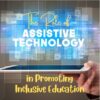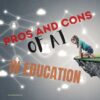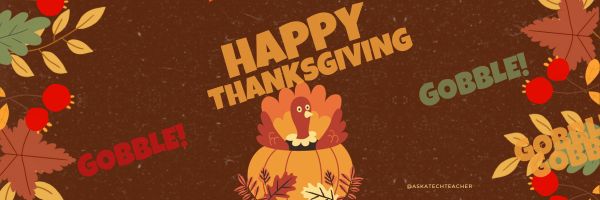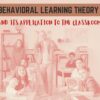Coding Activities by Grade
Over the next weeks, I’ll share ideas that will get you ready for Hour of Code. This includes (links are live on publication day):
- An Overview of This Week — Dec. 5, 2023
- Coding activities by grade — (this post) Dec. 6, 2023
- 9 Unusual Projects— Dec. 7, 2023
- 5 Unplugged Hour of Code Activities — Dec. 8, 2023
This is a long list of online activities related to coding and programming. It is updated once a year so I apologize in advance for any dead links. At any time during the year, click to take you to the master list:
Program on computers, iPads, laptops–whatever works, whatever age. I’ll start this list with web-based options, by grade level (click the grade you teach) and then continue with a mash-up:
Share this:
- Click to share on Facebook (Opens in new window) Facebook
- Click to share on X (Opens in new window) X
- Click to share on LinkedIn (Opens in new window) LinkedIn
- Click to share on Pinterest (Opens in new window) Pinterest
- Click to share on Telegram (Opens in new window) Telegram
- Click to email a link to a friend (Opens in new window) Email
- More
Hour of Code–Overview
Traditionally, the hugely-popular Hour of code has been celebrated one week in December, but now, you can participate any time you want. This year so far:
1,706,394,983 hours
in 180+ countries.
at 8,620 events
What is it
Hour of Code is a one-hour introduction to students on coding, programming, and why they should love it, designed to demystify that geeky subject that confounds students and teachers alike and show that anyone can learn the basics to be a maker, a creator, and an innovator.
Share this:
- Click to share on Facebook (Opens in new window) Facebook
- Click to share on X (Opens in new window) X
- Click to share on LinkedIn (Opens in new window) LinkedIn
- Click to share on Pinterest (Opens in new window) Pinterest
- Click to share on Telegram (Opens in new window) Telegram
- Click to email a link to a friend (Opens in new window) Email
- More
Here’s Why Your Kids Should Participate in Extracurricular Activities
Here’s Why Kids Should Participate in Extracurricular Activities
Most parents ignore this, but playtime activities significantly contribute to a child’s overall development. The key to raising children successfully is acknowledging that learning doesn’t take place only within the classroom environment. Similarly, academics aren’t the only key to success in the future. That said, below are a few reasons your child should actively participate in extracurricular activities:
Share this:
- Click to share on Facebook (Opens in new window) Facebook
- Click to share on X (Opens in new window) X
- Click to share on LinkedIn (Opens in new window) LinkedIn
- Click to share on Pinterest (Opens in new window) Pinterest
- Click to share on Telegram (Opens in new window) Telegram
- Click to email a link to a friend (Opens in new window) Email
- More
The Role of Assistive Technology in Promoting Inclusive Education
Here’s the complete overview on the role of assistive tech in encouraging inclusivity in education:
- What does that mead?
- What are the benefits?
- What are the drawbacks?
- What types are available?
- How do you create one in your class or school?
The Role of Assistive Technology in Promoting Inclusive Education
Persons with disabilities may struggle with coordination problems, short attention spans, and limited mobility, which may or may not be obvious. Some disabilities include blindness, deafness, dyslexia, and autism. Whether the symptoms are apparent or not, these disabilities can affect their cognitive and learning processes.
Share this:
- Click to share on Facebook (Opens in new window) Facebook
- Click to share on X (Opens in new window) X
- Click to share on LinkedIn (Opens in new window) LinkedIn
- Click to share on Pinterest (Opens in new window) Pinterest
- Click to share on Telegram (Opens in new window) Telegram
- Click to email a link to a friend (Opens in new window) Email
- More
Pros And Cons of AI in Education
Artificial Intelligence–AI–has been around a long time, but caught everyone’s attention with the launch of generative AI, ChatGPT, and DALL-E. These made using AI easy enough for anyone and a viable tool for educators and students.
Or is it? Let’s see what the Ask a Tech Teacher team says:
Pros And Cons of AI in Education
Artificial intelligence (AI) is making major inroads into education. AI tutors, virtual assistants, and adaptive learning platforms are being adopted by schools, colleges, and universities around the world. In addition, many students are using AI to write coursework and essays, which has caused a lot of outrage.
Proponents argue AI can make education more personalized, engaging, and effective while reducing costs and workload for teachers. However, critics worry about the risks and limitations of relying too heavily on AI in education, as well as the problems caused by students using AI rather than penning work themselves.
Here we explore some of the key pros and cons of the increasing use of AI in education, from an education professional’s perspective.
Share this:
- Click to share on Facebook (Opens in new window) Facebook
- Click to share on X (Opens in new window) X
- Click to share on LinkedIn (Opens in new window) LinkedIn
- Click to share on Pinterest (Opens in new window) Pinterest
- Click to share on Telegram (Opens in new window) Telegram
- Click to email a link to a friend (Opens in new window) Email
- More
E-Books and Online Libraries in Modern College Education
E-Books and Online Libraries in Modern College Education
One of the most significant archives of human knowledge and learning’s quiet companions, libraries have made an undeniable impact. As far back as history reaches, they played a vital role in helping students. We wouldn’t be where we are without them. Their shelves are stacked with the wisdom of civilizations, offering a passage through time for anyone willing to explore them. Libraries have always been a trusted educational sidekick since people started learning stuff. You might think libraries are withering away, but it’s not true. They’ve changed into online treasure hubs to help kids access education. Further, we will examine how libraries and schooling have always been connected and how important they are in shaping people’s paths and changing lives.
Share this:
- Click to share on Facebook (Opens in new window) Facebook
- Click to share on X (Opens in new window) X
- Click to share on LinkedIn (Opens in new window) LinkedIn
- Click to share on Pinterest (Opens in new window) Pinterest
- Click to share on Telegram (Opens in new window) Telegram
- Click to email a link to a friend (Opens in new window) Email
- More
Happy Thanksgiving! Taking a Break Nov. 17-Dec. 1
I wish you and all yours a wonderful Thanksgiving Break. Enjoy your family and friends, take time to rest.
I’ll be around only in a limited way until December 1. Then, I’ll be back fulltime.
Share this:
- Click to share on Facebook (Opens in new window) Facebook
- Click to share on X (Opens in new window) X
- Click to share on LinkedIn (Opens in new window) LinkedIn
- Click to share on Pinterest (Opens in new window) Pinterest
- Click to share on Telegram (Opens in new window) Telegram
- Click to email a link to a friend (Opens in new window) Email
- More
Teacher-Authors: What’s Happening on my Writer’s Blog
A lot of teacher-authors read my WordDreams blog. In this monthly column, I share a popular post that writer readers enjoyed:
For those reading this article who are either established authors, in-training, or anything in between, you probably have already figured out that the learning curve to become a writer is steep and endless. I’ve read a ton of how-to books, attended more than my share of conferences, and meet with fellow writers twice a month to discuss our passion. In each of these situations, no matter how often I attend, I learn something new. So it is no surprise that I also find epiphanies in social media. Some streams offer one person’s insight that addresses a chronic problem I also have. Others answer questions I couldn’t put into words enough to get an answer from anyone else.
Tips
Here are some of the best writing tips I’ve gathered on social media in the past year:
Share this:
- Click to share on Facebook (Opens in new window) Facebook
- Click to share on X (Opens in new window) X
- Click to share on LinkedIn (Opens in new window) LinkedIn
- Click to share on Pinterest (Opens in new window) Pinterest
- Click to share on Telegram (Opens in new window) Telegram
- Click to email a link to a friend (Opens in new window) Email
- More
14 Apps and 2 Projects for Thanksgiving
Need a few websites and apps to fill in sponge time? Here are Thanksgiving websites that will keep students busy and still teach them:
- Berenstein Bears Give Thanks (app)
- Canadian Thanksgiving
- Online/Offline Thanksgiving activities
- Plimoth Plantation–a field trip of a Pilgrim’s life. Included on this real-life site is a video of the Pilgrim’s crossing to the New World.
- Thanksgiving edu-websites–CybraryMan
- Thanksgiving Games
- Thanksgiving games and puzzles
- Thanksgiving games–Quia
- Thanksgiving Lesson Plans
- Thanksgiving Wordsearch
- Turkey Templates — activities in Google Slides
If you’re an iPad school, try one of these:
- Berenstein Bears Give Thanks
- Primary Games–games, coloring books, more
- Thanksgiving coloring book
If you’re looking for projects, you’ll find two on Ask a Tech Teacher:
For more, click here:
- Thanksgiving ASCII Art
- Comics
- Countdown Clock for the Holiday
- Team Challenge
- Thanksgiving Poll
Here’s a gallery of some of the Thanksgiving/Holiday projects:
Share this:
- Click to share on Facebook (Opens in new window) Facebook
- Click to share on X (Opens in new window) X
- Click to share on LinkedIn (Opens in new window) LinkedIn
- Click to share on Pinterest (Opens in new window) Pinterest
- Click to share on Telegram (Opens in new window) Telegram
- Click to email a link to a friend (Opens in new window) Email
- More
Understanding Behavioral Learning Theory & Its Applications In The Classroom
The Ask a Tech Teacher team has written a great article on behavioral learning in the classroom. You’ll find out:
- What it is
- Keys to unpacking it
- Why it matters in education
- Examples in the classroom
- Techniques for applying it
- Challenges
Behavioral Learning Theory & Its Applications In Class
If you’re an educator or a parent, equipping yourself with knowledge of behavioral learning theory can transform your classroom dynamics and alter how you perceive the process of learning itself. If the entire concept is alien to you at the moment, hold tight as we talk you through the main aspects, and how they can hold relevance in modern teaching environments.
Introduction to Behavioral Learning Theory
Behavioral learning theory can sound complex, but it’s actually quite straightforward. It stipulates that all behaviors are learnt through interactions with the environment.
While biology may play a part, this theory focuses on acquired behavior and how your responses can change over time.
Conditioning is at the center of this theory, and it posits that humans learn by developing associations between their actions and the consequences they experience in real-time.
Share this:
- Click to share on Facebook (Opens in new window) Facebook
- Click to share on X (Opens in new window) X
- Click to share on LinkedIn (Opens in new window) LinkedIn
- Click to share on Pinterest (Opens in new window) Pinterest
- Click to share on Telegram (Opens in new window) Telegram
- Click to email a link to a friend (Opens in new window) Email
- More

















































